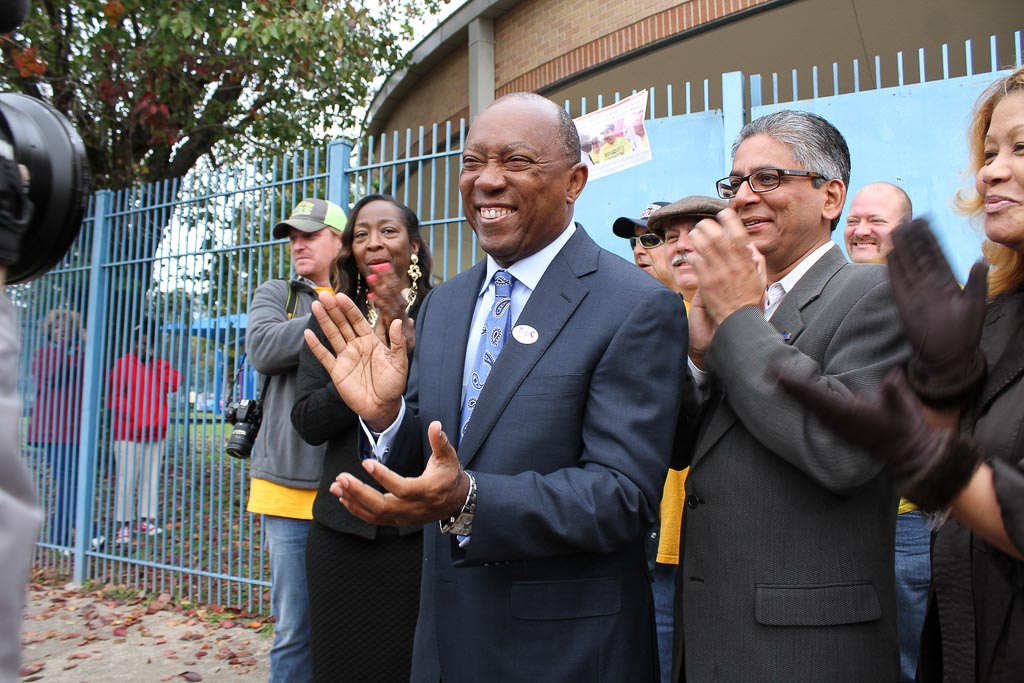When Houston Mayor-Elect Sylvester Turner takes office next month, he'll have to hit the ground running. Below is a list of some of the most critical (and perhaps controversial) issues facing Houston as its first new mayor in six years takes office.
Economy -- Houston boomed under Mayor Annise Parker, in part because she had extremely good timing: she led the city from 2010 through 2015, and for most of that period, Houston's economy surged as the rise of hydraulic fracturing, coupled with high oil prices, spelled good times for the city's bedrock industry: energy. Today, oil is priced at less than $40 per barrel, half what it was when Parker took office in 2010. Now, experts are warning that Houston's economy will almost certainly sag in 2016. Though the mayor has no control over the global energy industry, that's unlikey to stop Houstonians from demanding that Turner shepherd the city through this difficult period and find creative ways to shore up its economy.
Pensions -- Though former Kemah Mayor Bill King failed in his bid against Turner, he had one major victory: making the city's pension situation the most-discussed political issue in Houston. Political observers say King's relentless message about the need to address the city's pension expenses is one of the reasons he came so close to winning the election. The city's police, fire, and municipal employee pension systems are underfunded by a combined $3.2 billion, according to the Houston Chronicle. But addressing those expenses won't be easy. The terms of Houston's firefighter pension plan are largely dictated by the state Legislature, which means the city can't address the situation entirely on its own. Meanwhile, any reforms to any of the pension plans would likely be fought by employee unions, many of whom support Turner. Though Turner has not offered many specifics about how he would address the city's pensions, there's no doubt it will be a question in 2016, considering the topic dominated the 2015 campaign.
Infrastructure -- Potholes are a perpetual problem that just about every candidate always pledges to address. But the issue took on heightened importance during this year's mayoral campaign. Outgoing Mayor Annise Parker called Houston's pothole problem a "crisis" earlier this year and acknowledged the city just hasn't done enough to fix them. The ReBuild Houston, on the books since 2010, was intended to provide a way to address the city's drainage and streets through a pay-as-you-go funding mechanism. That program has faced legal challenges, but Turner has touted the initiative. The debate over the program -- and the problems it's intended to address -- will almost certainly continue through 2016.
Police -- Turner's campaign emphasized the importance of a robust police force, noting that the number of Houston police officers has remained roughly the same size over the last decade, even though Houston's population surged during that period. According to a 2014 report commissioned by the Houston Police Department, even though Chicago is only slightly larger than Houston (2.2 million residents compared to 2.7 million), its police force is more than twice as large (5,300 cops compared to 11,900). Turner says he wants to examine the revenue cap, which limits the amount of money the city can collect in taxes, as a way to potentially direct more funding toward public safety. But any efforts to increase taxation would likely encounter fierce resistance from his critics.
Mobility -- Last year, the Kinder Houston Area Survey revealed that residents think traffic is the biggest problem facing Houston. Indeed, 65 percent of residents say traffic has worsened over the last 3 years. Houstonians -- who've enjoyed the expansion of light rail and improvements to bus service -- are continuing to demand improved transit. Can the new mayor help provide it? While the mayor appoints the majority of Metro's board, it's a separate entity from the city. Turner will have to figure out a way to help meet residents' desire for a transit at a time when Metro is just about done building light rail, and plans to build bus rapid transit in the Galleria-area are facing some serious legal hurdles.
Affordability -- While Houston has long been known for its reasonably-priced housing, that's starting to change quickly. In 2010, about 30 percent of residents spent 30 percent or more of their income on housing and transportation. By 2013, that number had risen to 35 percent. Put another way: over the last decade, the average home price in greater Houston rose 50 percent -- about double the national rate. Those price hikes have been good for some real estate investors and sellers, but they've caused real pain for families struggling to find affordable housing. City leaders have already identified the need to foster affordability as a key goal in Houston's general plan. But Turner has acknowledged the challenge of mandating affordability in a city that lacks many zoning and land-use controls.

